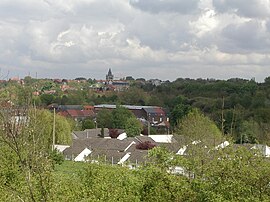Bruay-la-Buissière
Bruay-la-Buissière Bruwaei | |
|---|---|
 A general view of Bruay-La-Buissière | |
| Coordinates: 50°28′55″N 2°32′55″E / 50.4819°N 2.5486°E | |
| Country | France |
| Region | Hauts-de-France |
| Department | Pas-de-Calais |
| Arrondissement | Béthune |
| Canton | Bruay-la-Buissière |
| Intercommunality | CA Béthune-Bruay, Artois-Lys Romane |
| Government | |
| • Mayor (2020–2026) | Ludovic Pajot[1] (RN) |
Area 1 | 16.35 km2 (6.31 sq mi) |
| Population (2022)[2] | 21,997 |
| • Density | 1,300/km2 (3,500/sq mi) |
| Time zone | UTC+01:00 (CET) |
| • Summer (DST) | UTC+02:00 (CEST) |
| INSEE/Postal code | 62178 /62700 |
| Elevation | 30–106 m (98–348 ft) (avg. 98 m or 322 ft) |
| 1 French Land Register data, which excludes lakes, ponds, glaciers > 1 km2 (0.386 sq mi or 247 acres) and river estuaries. | |
Bruay-la-Buissière (French pronunciation: [bʁyɛ la bɥisjɛʁ]; West Flemish: Bruwaei, Picard: Brouay-l'Bussière) is a commune in the Pas-de-Calais department in the Hauts-de-France region in northern France.[3]
Geography


It is a former coalmining town some 6 miles (9.7 km) southwest of Béthune and 30 miles (48 km) southwest of Lille, at the junction of the D57 and the N47 roads.
History
With four coal mines, it was the headquarters of the Bruay Mining Company. The coal mines closed during the 1960s, to be replaced by light industrial work and chemical factories. In April 1972 the murder of miner's daughter Brigitte Dewevre became a politicized event when Pierre Leroy, a local middle-class lawyer associated with the local mining company, was arrested: La Cause du Peuple, the paper of the Maoist Gauche prolétarienne, publicized the case with the headline 'Bruay: And Now They Are Massacring Our Children!'[4]
The two former communes of Bruay-en-Artois and Labuissière were joined as one commune in 1987.[5]

Population
The population data given in the table and graph below for 1982 and earlier refer to the former commune of Bruay-en-Artois.
|
| ||||||||||||||||||||||||||||||||||||||||||||||||||||||||||||||||||||||||||||||||||||||||||||||||||||||||||||||||||
| Source: EHESS[5] and INSEE (1968-2017)[6] | |||||||||||||||||||||||||||||||||||||||||||||||||||||||||||||||||||||||||||||||||||||||||||||||||||||||||||||||||||
Sights
- The Hôtel de Ville (Town Hall), 47 m tall built in 1927. The windows recount scenes from the lives of miners.
- The Art Deco swimming pool, built in 1936 (the last remaining Art Deco pool open to the public)
- The Museum of mining.
- The Church of Saint Martin, dating from the fifteenth century, was expanded and renovated in 1974.
- Ballencourt manor in Labuissière, was built in 1777. Partially renovated, it now hosts the music school.
- The donjon of the castle of La Buissière, built in 1310 by Mahaut, Countess of Artois.[7]
- The church at Labuissière, presently closed to the public for renovation work.
- The Velodrome at Labuissière built by the Bruay Mining Co., in 1925.
- The Museum of calculation and Scripture. Traces the history of writing and calculating machines such as the Enigma German coding machine.
See also
References
- ^ "Répertoire national des élus: les maires" (in French). data.gouv.fr, Plateforme ouverte des données publiques françaises. 6 June 2023.
- ^ "Populations de référence 2022" (in French). The National Institute of Statistics and Economic Studies. 19 December 2024.
- ^ INSEE commune file
- ^ La Cause de Peuple, 1 May 1972. Cited in 'Showdown at Bruay-en-Artois', ch. 1 of Richard Wolin, The Wind from the East: French Intellectuals, the Cultural Revolution, and the Legacy of the 1960s, Princeton University Press, 2010.
- ^ a b Des villages de Cassini aux communes d'aujourd'hui: Commune data sheet Bruay-la-Buissière, EHESS (in French).
- ^ Population en historique depuis 1968, INSEE
- ^ Base Mérimée: Château de la Buissière, Ministère français de la Culture. (in French)
External links
- The CWGC graves in the Bruay-la-Buissière communal cemetery
- Official website of the commune (in French)
- A website about the commune (in French)
- Website of the Communauté du Bruaysis (in French)




